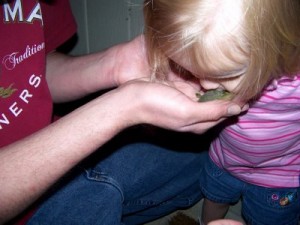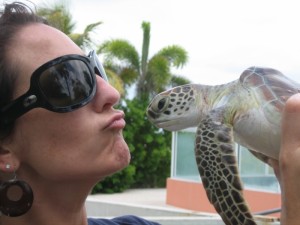JoNel Aleccia of NBC News writes that multiple outbreaks of salmonella infections tied to tiny pet turtles have drawn sharp warnings from government health officials and an unusual offer from a leading pet retailer: Return them here.
Petco, the pet products chain, has launched a “turtle relinquishment program” aimed at both curbing illness and giving the rejected reptiles  new homes.
new homes.
Dawn Burch, veterinary relations manager for Petco, said the firm started accepting wayward turtles in May, just about the time the Centers for Disease Control and Prevention began warning about growing numbers of salmonella infections tied to the aquatic critters.
As of last week, 219 people in 34 states had been sickened in six overlapping outbreaks by salmonella found in small turtles sold in souvenir shops and at street fairs, CDC officials said. Infections have been caused by three rare strains of salmonella: Sandiego, Pomona and Poona.
“We saw this concern through the CDC and we thought, ‘How can we help in this situation?’” Burch said.
So far, 111 people in 10 states have taken Petco up on the offer and returned the turtles, typically red-eared sliders with shells that measure less than 4 inches across. People who want to participate can simply take the turtles to the nearest store. Though the CDC warning applies to the smallest turtles, Petco will accept turtles of any size, Burch said.
Petco has an agreement to send the turtles to Concordia Turtle Farm in Jonesville, La., which hatches, raises and sells turtles in the U.S. and abroad. Daisy DeWitt, a staffer at the farm, said the turtles are treated for any signs of salmonella and then placed in clean tanks where they thrive.
Some three million to four million red-eared sliders are exported from the U.S. every year, including many sent to foreign countries where they are regarded as pets — and sometimes as delicacies to eat, according to a turtle-protection group called the Tortoise Trust.
Getting the turtles out of the hands of young children — literally — is the main concern of the CDC, said Lola Russell, an agency spokeswoman. The salmonella infections were detected in six separate but overlapping  outbreaks dating from June 2011 to late September. Thirty-six people were hospitalized; no deaths were reported.
outbreaks dating from June 2011 to late September. Thirty-six people were hospitalized; no deaths were reported.
Two-thirds of those sickened in the outbreak have been children younger than 10; 30 percent of those who became ill are babies younger than 1, according to the CDC report. Infection typically occurs when young children handle turtles or related objects and then put their hands in their mouths.
Half of those who got sick were Hispanic, said officials, who issued warnings in Spanish and English.
“Many people don’t know that turtles and other reptiles can carry germs that can make people very sick,” Casey Barton Behravesh, a veterinarian and deputy chief of the CDC’s outbreak response and prevention branch, said in a statement.
“For this reason, turtles and other reptiles might not be the best pets for your family, especially if there are children 5 years and younger or people with weakened immune systems living in your home.”
 The announcement includes more than 1,300 stores nationwide, including 42 in Ohio, as well as Unleashed by Petco stores and online sales at Petco.com.
The announcement includes more than 1,300 stores nationwide, including 42 in Ohio, as well as Unleashed by Petco stores and online sales at Petco.com. 

